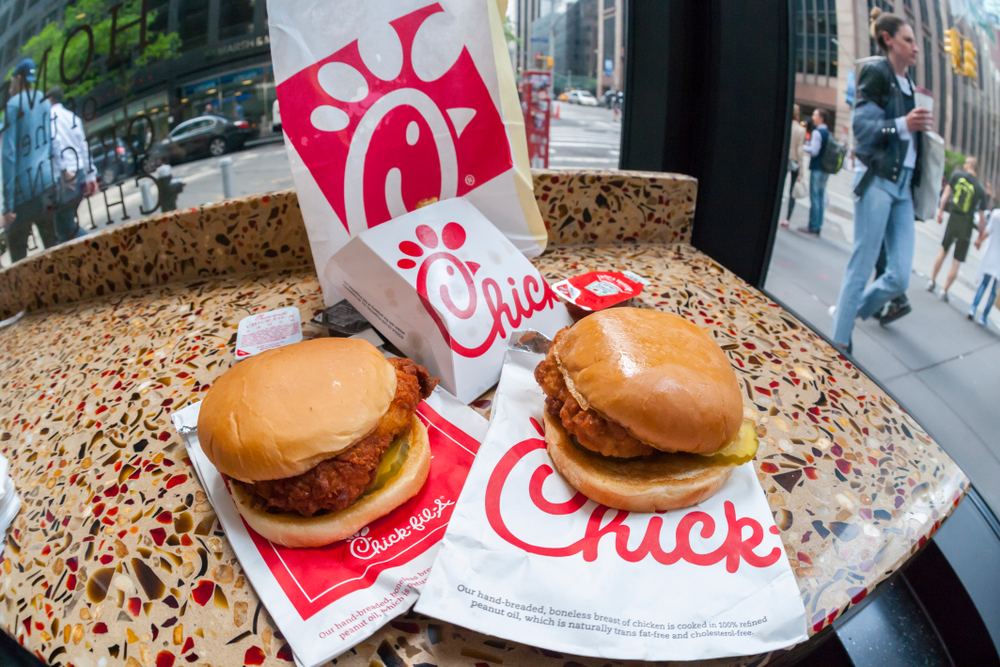- Chick-fil-A franchise operators pay just $10,000 to open a new restaurant in the US.
- About 60,000 people apply for a franchise each year, and less than 1% of them are eventually chosen.
- Here’s what the process of opening a Chick-fil-A is like from start to finish.
- Visit Business Insider’s homepage for more stories.
With a fee of just $10,000, Chick-fil-A franchises are cheap to open compared with other fast-food restaurants.
But the odds of becoming a Chick-fil-A franchise operator are stacked against you.
About 60,000 people apply for a franchise each year, and only about 80 are selected, according to a company spokesperson, giving applicants about a 0.13% chance of success – only slightly better than the odds of a high-school basketball player getting drafted into the NBA (about 0.03%).
If you’re eager to take the helm of one of the 120 Chick-fil-A stores that open each year, you can expect an arduous vetting process.
It begins when you officially apply to become a candidate. To decide if being a franchisee is right for you, Chick-fil-A offers informational sessions around the country that you can attend to learn more and get your questions answered, but they're not mandatory, and you can apply without attending. When you're ready to throw your hat into the ring, the process begins with simply entering your email address on the Chick-fil-A franchise-information page.
From there, you'll receive an application and take part in a series of interviews - a dozen or more, according to Forbes. Some of the interviews are conducted via phone, but franchisees have reported being interviewed by video chat and in person as well. You can be dropped from the candidate program at any time, even after undergoing multiple rounds of interviews.
The Chick-fil-A team's interview process is lengthy - franchisees told Forbes that the process takes many months, and sometimes as long as a year. It's designed to review you holistically, considering factors that measure not just your professional competency but also factors like character and chemistry.
Part of the reason for this thoroughness is that the company isn't looking for an absentee store manager. As the company's corporate materials indicate, they expect franchise operators to give an enormous amount of personal attention to their franchises.
"Being a franchised Chick-fil-A Operator is anything but a passive investment," Chick-fil-A says on its website.
And the company wants franchisees to consider it their primary business - not an investment or one of several locations in a fast-food empire. Though there are exceptions, franchise operators generally get to run only one store at a time.
Read more: It costs nearly nothing to open a Chick-fil-A - but there's a catch
At the same time, Chick-fil-A famously tries to hire operators who represent the core values of the company, so it looks for signals that you are active in the community where the store will be, and it evaluates your personal character.
On the other hand, you may have read that Chick-fil-A insists that you have prior food-service experience, have managed a restaurant, or even have worked at a Chick-fil-A in particular. None of those things are true, according to the company, and in fact, some franchise operators have little or no experience with operating a fast-food restaurant. Chick-fil-A touts Jim Toth, a franchise operator in Temecula, California, who is a retired Marine with no prior food-service experience. Even so, more than half the candidates who are eventually offered franchises have some prior job experience with Chick-fil-A, the company says.
The good news is that if you are selected for a franchise, your personal financial stake in the franchise is low. You're asked to invest only $10,000, and the company pays all startup costs associated with building the store and getting it off the ground. In exchange, you are an "operator," not an "owner." You don't actually own the store - you can't sell it when you want to retire or make it part of an inheritance. Chick-fil-A owns the local business, the physical property, and the intellectual property.
If you're lucky enough to be one of the 0.13% of candidates who get selected and offered a store, the last phase of your franchise prep is an extensive multiweek training program. This training, which lasts about six weeks, is designed to teach the mechanics of running a fast-food restaurant - food preparation, accounting, customer relations, communications, maintenance, purchasing, planning, management skills, marketing, and more.
And when you emerge from the training, you are the newest operator - not owner - of a Chick-fil-A location.

